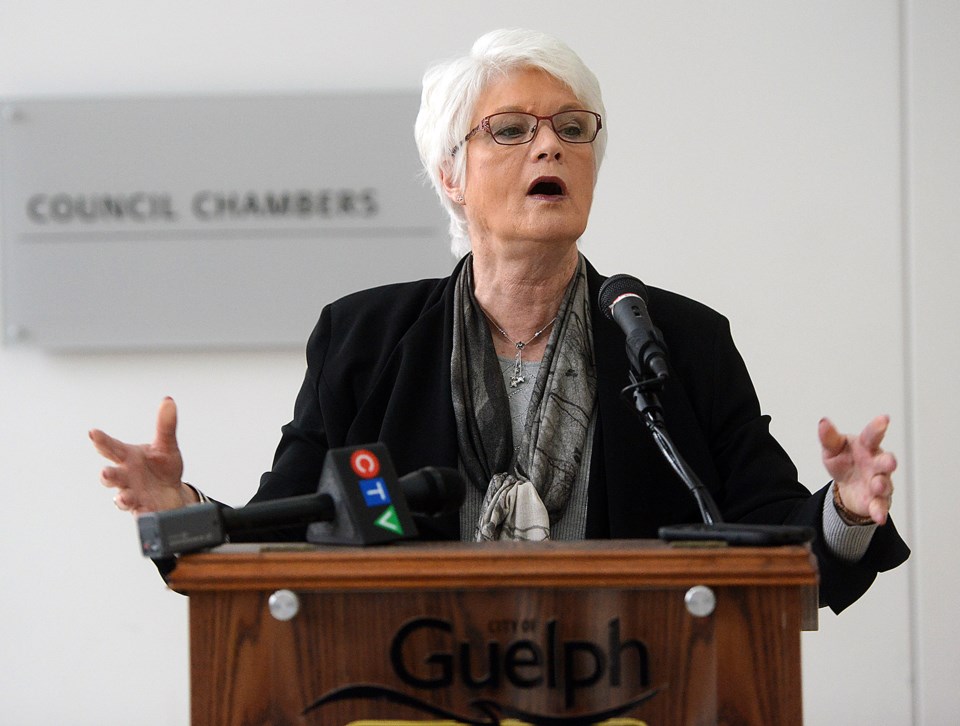On Monday, Guelph MPP and President of the Treasury Board, Liz Sandals, explained some of the thinking behind, and benefits of items contained in the Ontario throne speech.
Premier Kathleen Wynne’s throne speech was read at noon Monday in the Provincial Legislature by Lieutenant Governor Elizabeth Dowdeswell.
It contained rebates on electricity rates, as well as measures to significantly boost licensed daycare spaces for small children, and a dramatic push to improve the math skills of Ontario students.
Sandals said there is a clear need in Guelph and across the province for more child care spaces, and the move to add 100,000 new spaces province-wide over the next five years is an important one.
“The spaces we will be adding will be focused on the zero to four age group, so the infants and pre-schoolers,” she said. “We know that is where there is unmet demand. And to put it in perspective, 100,000 licensed spaces is like doubling the current capacity for the zero to four age group.”
She said the addition will be of benefit to a great many families.
“It doesn’t really matter if you are low income or high income, if you’re a mom and you have a baby or a toddler and your maternity leave is over and you need to go back to work, you need childcare,” she said, adding that access to licensed daycare is what most want.
Concurrently, the Government of Ontario is expanding before-school and after-school programs for the province’s children. And major investments have already been made on childcare for kids in full-time kindergarten, she added.
Sandals said the move to rebate the eight per cent provincial sales tax on electricity will benefit all electricity rate payers, particularly those in rural areas where those rates can be much higher.
She said the Wynne government already got rid of the debt retirement charge on the hydro bill, and the Ontario Energy Support Program reduces costs for low income households.
“We know that there are just lots of average families who need some help with the electricity bill,” she said. “The first thing we’re doing is the eight per cent rebate, which is the equivalent of taking the provincial portion of the HST off the bill.”
The reduction applies to the so-called residential rate program, she said, which is also applicable to farms and small businesses.
The throne speech acknowledged that electricity costs were a strain on family budgets, and the changes will save an average of $130 annually for homeowners, and about $540 on average on farms and other rural areas.
Sandals explained the rural areas have higher electricity distribution charges, and farms often don’t have access to natural gas heating and are therefore more likely to heat with electricity.
While there may be a public perception that Ontario’s hydro rates are too pricey, Sandals added, the province’s financial accountability officer recently reported that the average family in the province spends less on electricity than all other provinces, aside from British Columbia.
She added that Ontario’s rates certainly have gone up in recent years, but had been kept artificially low by previous governments.
The throne speech also reaffirmed that drastic measures are being taken to boost math competency in Ontario schools. About half of Grade 6 students are failing to meet the provincial math standards. As the education minister, Sandals was instrumental in crafting the measures last winter.
“As we saw that the math results were going down, we went to the other jurisdictions that were doing better than us and asked, what’s different?” Sandals said.
It’s not the curriculum that is different, she indicated. But in jurisdictions that did better in math, more time was spent practicing math, and teachers had more training in how to teach math.
As of now, elementary students will be required to spend 60 minutes per day doing math – a significant increase for some schools. As well, professional development for teachers will increase, and there will be a requirement for at least one math expert on staff in each elementary school, as many as three in large schools.
“I think it will make a huge change,” Sandals said.
